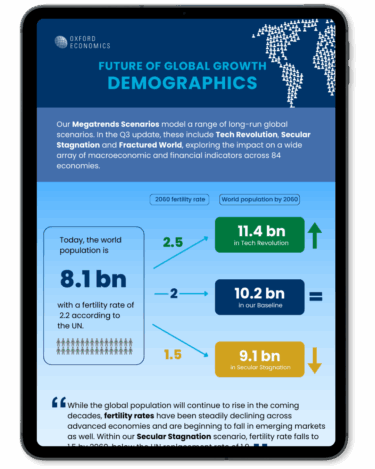Recent Release | 07 Jul 2023
Ready for take-off: Why niche markets are the next big thing

Thought Leadership and Economic Consulting Teams
Oxford Economics

Technological innovation is key to confronting the world’s most important and pressing societal issues, from clean transportation, to food security and quality healthcare. Many of the most disruptive solutions are first commercialised in emerging, niche markets, but often remain underdeveloped and subscale for too long, foregoing a huge amount of value.
In this study, Oxford Economics helped Accenture Research explore the potential value that could be unlocked for the economy and the wider society if big business could embrace innovations in what the study identifies as “tech propelled markets” – that is markets where tech-enabled innovations are created to address specific unmet needs (e.g. mobility solutions for the elderly, or e-commerce solutions for remote rural consumers). We used quantitative use-case analysis to frame and analyse the potential economic and societal pay-offs from a range of specific innovations in tech-propelled markets in Japan, the UAE, Singapore, Indonesia, Brazil, and India.
The experts behind the research
Our Economic Consulting and Thought Leadership teams are world leaders in quantitative economic analysis and original, evidence-based research, working with clients around the globe and across sectors to build models, forecast markets, run extensive surveys, and evaluate interventions using state-of-the art techniques. Lead consultants on this project were:

James Lambert
Director Economic Consulting, Asia

Kankon Sen
Economist, Economic Impact
Tags:
You might also be interested in

Future of Global Growth: Demographics
Our Megatrends Scenarios model a range of long-run global scenarios. In the Q3 update, these include Tech Revolution, Secular Stagnation and Fractured World, exploring the impact on a wide array of macroeconomic and financial indicators across 84 economies.
Find Out More
Roadblocks to China’s chip self-sufficiency dream
China is unlikely to achieve full chip self-sufficiency any time soon because of high technological hurdles in producing advanced manufacturing equipment and materials. The self-sufficiency target now stretches well beyond actual fabrication to include the entire chip supply chain as China struggles to acquire necessary input and machinery into the production process.
Find Out More
Why invest in AI ethics and governance?
In collaboration with the Notre Dame-IBM Technology Ethics Lab, Oxford Economics conducted 15 interviews with senior executives in 2024 to better understand how organizations are evaluating the ROI of AI ethics investments.
Find Out More
Global P&C Insurance Outlook to 2050
Capgemini leveraged custom macro and insurance market forecasts from Oxford Economics for their latest P&C insurance flagship report.
Find Out More